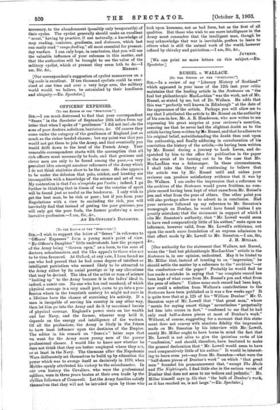[To THE EDIToIt OP TUE "SPECTATOR.")
wish to support the letter of " Senex " in reference to "Officers' Expenses" from a young man's point of , view.
Ex-Officer's Daughter" little understands bow the prospect a the Army being "thrown open," as a boon, to the sons of doctors, schoolmasters, and the like appeals to those who are to be thus favoured. At Oxford, at any rate, I have foiled no one who had proved that he had some degree of intellect or intelligent patriotism who seemed likely to be attracted to the Army either by its social prestige or by any alterations that may be devised. The idea of the artist or man of science "looking up" to the Army because it is the ladies' ideal in, indeed, a comic one. No one who has real manhood, of which physical courage is a very small pelt, cares to go into a pro- fession where in the twentieth century h3 might not once in a lifetime have the chance of exercising his activity. If a man is incapable of serving his country in any other way, then let him go into the Army and do it by occasional bursts of physical courage. England's power rests on her wealth and her Navy, and the former, whoever may hold it, depends on the energy and intelligence of the workers. Of all the professions, the Army is likely in the future to have least influeuce upon the destinies of the Empire. The editor in his remark on " Senex's " letter says that we want for the Army more young men of the poorer professional classes. I would like to know now whether he does not think that they are better employed where they are, or at least in the Navy. The Germans after the Napoleonic Wars deliberately set themselves to build up by education the power which was to avenge itself so decisively in 1870, when Moltke openly attributed his victory to the schoolmaster. In oar own history the Cavaliers, who were the professional s9hliers, were in three years beaten at their own trade by the eiyilian followers ,of Cromwell. Let the Areay.families.satisfy themselves that they will not be intruded upon by those who
look upon keenness, not as bad form, but as the first of all qualities. But those who wish to see more intelligence in *the Army must remember that the intelligent man, though he may acknowledge that war is inevitable, prefers to leave to others what is still the animal work of the world, however refined by chivalry and patriotism.—I am, Sir, &c., • JUVENIS.
[We can print no more letters on this subject.—BD. Spectator.]


























































 Previous page
Previous page